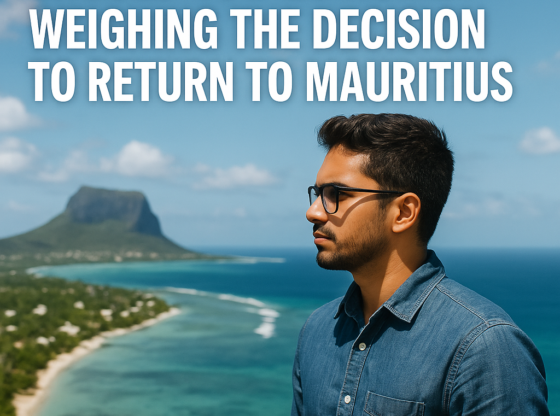For a Mauritian who has spent significant time abroad, the idea of resettling on the island brings real excitement—and a dose of serious reflection. Reddit and other forums are filled with threads where people are questioning whether to return to Mauritius either for love, for country or for aging parents. To be honest, it entirely depends on what you want from life but here are some pros and cons about moving back, mostly from personal experience of living in the country for few years.
Why Returning Makes Sense
- Favourable Financial & Tax Environment
Mauritius offers a flat 15% income tax, with no capital gains or inheritance taxes, and generous exemptions on foreign-sourced income—especially dividends and interest . There’s also a special 10‑year income tax exemption under the Diaspora Scheme for returnees . - Opportunity to Engage Your Expertise
The Diaspora Scheme invites Mauritians abroad—especially skilled professionals and entrepreneurs—to return and invigorate industries with valuable expertise . Academia shows that more than 20% of national “human capital” resides overseas, and integrating that talent is both essential and encouraged. - Strong, Diversified Economy
With a GDP nearing $16 billion and stability anchored by banking, ICT, tourism, and export sectors, Mauritius has transitioned from agriculture-dominated to an upper-middle-income economy. Ease of doing business continues to improve (13th globally) and government incentives support SME and export-oriented growth . So if you are looking to start a business, it could be a good opportunity to leave your job and setup something in your own country. - High Quality of Life
The island offers a laid‑back lifestyle and is ranked as one of the safest African islands. However, laid-back lifestyle might not be suitable for everyone especially if you are relocating from cities like New York, Paris, Tokyo or Mumbai. A relaxed lifestyle might get boring sooner than you think if you are now used to fast paced lifestyle and a noisy nightlife.
The Challenges You Should Know
- Economy’s Heavy Dependence on Tourism
Despite diversification, tourism still underpins the economy. Global disruptions or natural disasters—especially cyclones or coastal erosion—pose ongoing risks. - Vulnerability to Climate Change
Extreme weather events, flooding, and shoreline degradation are already affecting infrastructure and commerce. A new climate levy aims to fund adaptation—but resilience remains an urgent concern. - Local Job Market & Price Sensitivity
Salaries in key domestic roles can be lower than abroad, and goods—especially electronics, cars, imported products—can remain pricey due to import duties. Cost of living is pretty high here and could feel like a pain especially if you are used to earning in dollars and euros. Pay is not as high as European or American companies and if you are planning for job, good idea would be to work for a foreign company and get paid in foreign currency. - Island-Sized Limitations
As a small economy, Mauritius can feel insular. Consumer choice can be limited, bureaucracy—or informal relationships—may frustrate newcomers, and public transport outside major hubs isn’t always reliable.
Who Should Strongly Consider Returning
Ideal scenarios for returnees include:
- Qualified professionals or entrepreneurs in finance, ICT, healthcare, or tourism, who can leverage the Diaspora Scheme’s incentives.
- Families and retirees drawn to safety, lower cost of living, friendly communities, and a slower pace of life.
- Remote workers or digital nomads who can relocate with minimal disruption to their career.
- If you already own a house – You can save a ton on rent and it might lead to a luxury lifestyle.
In 2025, expats earning around MUR 40,000 (approx. USD 1,000) per month can live comfortably—especially if they prioritize housing and local food .
Smart Strategies for Moving Back
- Apply for the Diaspora Scheme to benefit from tax breaks and official support.
- Tap into networks: Reach out to returning diaspora, professional associations, local incubators, or digital nomad communities.
- Plan for climate risks: Choose resilient locations, invest in insurance and sound housing.
- Factor in costs: Imported tech and vehicles cost more; investigation into local alternatives is worthwhile.
